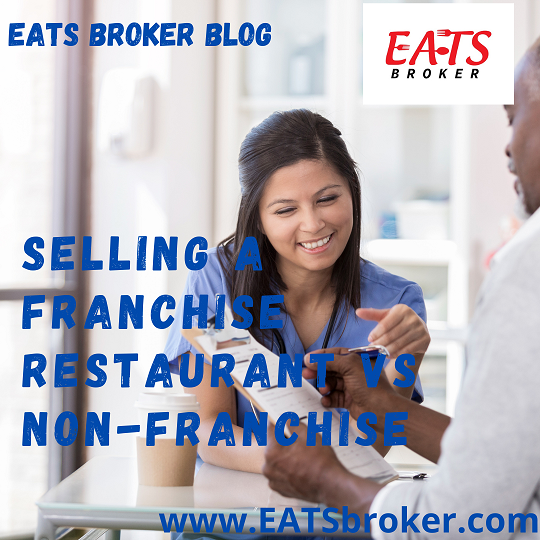What are the Pros and Cons of Selling a Franchise Restaurant vs. Non-Franchise is a common question EATS Restaurant Brokers receives from sellers? Franchise Restaurants for Sale make up 60%-70% of all restaurant sold listings annually. Why is the number so high compared to independently owned restaurants?
The hard facts are only 30%-40% of restaurants listed on the for-sale market will get sold to new buyers. Why does a Franchise Restaurant have a better chance of being sold than a non-franchise restaurant for sale?
EATS Broker discuss the Pros and Cons:
Pros:
- Trade Name: Franchisees have the right to use an established trade name, marks, logo, and goodwill. Buyers are generally knowledgeable about the concept and menu.
- Restaurant Valuation: Franchise Restaurants usually get a higher price valuation.
- Franchise Business Consultant: New buyers are assigned a Consultant from the franchise brand to receive additional training and support.
- Books and Records: Franchise Restaurants are known to have better books and records to provide to buyers. Franchise concepts typically require Franchisees to have updated POS sales systems.
- Landlord Approval-: Landlords, are most comfortable approving restaurant concepts for lease spaces. Occasionally lease assignments will have guaranteed landlord approval for franchise concepts.
- Bank Lending: Banks view franchise restaurants as less risky loans compared to an independently owned restaurant. The approval process, at times, can be quickly done.
Cons:
- Franchise Fee: Initial Franchise Agreement Fee ranges from $20,000-$100,000+ depending on Franchise. When a restaurant transfers to a new buyer, a transfer fee is generally required, usually up to 50% of the Franchise Agreement fee.
- Royalty: This operating fee is calculated based on Gross sales ranging from 3%-10% (it could be higher).
- National Marketing Fee: Required fee each franchisee pays to the franchisor to help with the franchise marketing cost. Expenses can range from 0%-6%.
- Remodel Cost: Franchises require locations to date on current specs before a sales transfer can take place to a new buyer. Restaurant remodels cost can be prohibitive depending on the Franchise’s current location requirements. Required upgrades can range from updated tables, chairs, signage, POS system upgrade, lighting, and cooking equipment.
- Required Training: New franchisees are required to complete a certain number of hours working in the restaurant before a buyer can achieve a sales transfer. This process from start to finish can range from 2 weeks-3 months.
- Franchise Approval: Buyers have to get approved by the Franchise.
- Vendors: Franchises have a list of preferred vendors that the franchisees must use.
Independent Owned Restaurant for Sale
Pros:
- No Royalty: Buyers are not required to pay 3%-10% to any franchise; this could equal hefty savings yearly.
- No Required Training: The buyer can schedule training with the seller, but a certain number of hours working in the new buyer’s business is not required to complete the transaction.
- Time to close: Once the buyer and seller agree to terms on an Asset Sale purchase and the landlord approves the new buyer, the deal can close. One of the most significant advantages of non-franchise sales is the lack of time to complete this deal. Instead of 2-4 months to close on a franchise concept, a buyer can close on a non-franchise restaurant in 2-4 weeks.
- Remodel Cost: Sellers are not required to do any upgrades unless buyers request.
- National Marketing Fee: Buyers are not required to pay an automatic marketing fee to anyone.
- Freedom: Have the ability to make changes with getting franchise approval. Owners have the freedom to choose their vendors.
- Local: Customers like to support local restaurants that are not national franchise concepts.
Cons:
- Restaurant Valuation: Normally are lower than Franchise concepts. Unless the restaurant has good books and records, goodwill, and has been open and established for years.
- Training: New buyers are on their own to learn the concept, operations, employees, and marketing. The buyer usually completes no formal training before or after the sale transaction.
- Trade name: Building up the trade name is 100% the responsibility of the operator. The new owner has to maintain or establish a new identity for the restaurant.
- Books and Records: Keeping updated and accurate books and records can be challenging for non-franchise concepts.
- Landlord approval: Landlords will frequently do more due diligence on a non-franchise concept before they approve a lease assignment. From the landlord’s standpoint, it is riskier to approve a non-franchise compared to a franchise concept.
Franchise Restaurant ownership and independently owned restaurants have tons of pros and cons to consider when buying a restaurant.
EATS Broker are Subject Matter Experts in Restaurant resales. Let us provide you a complimentary Certified Restaurant Valuation; contact us today at [email protected] or 404-993-4448.


